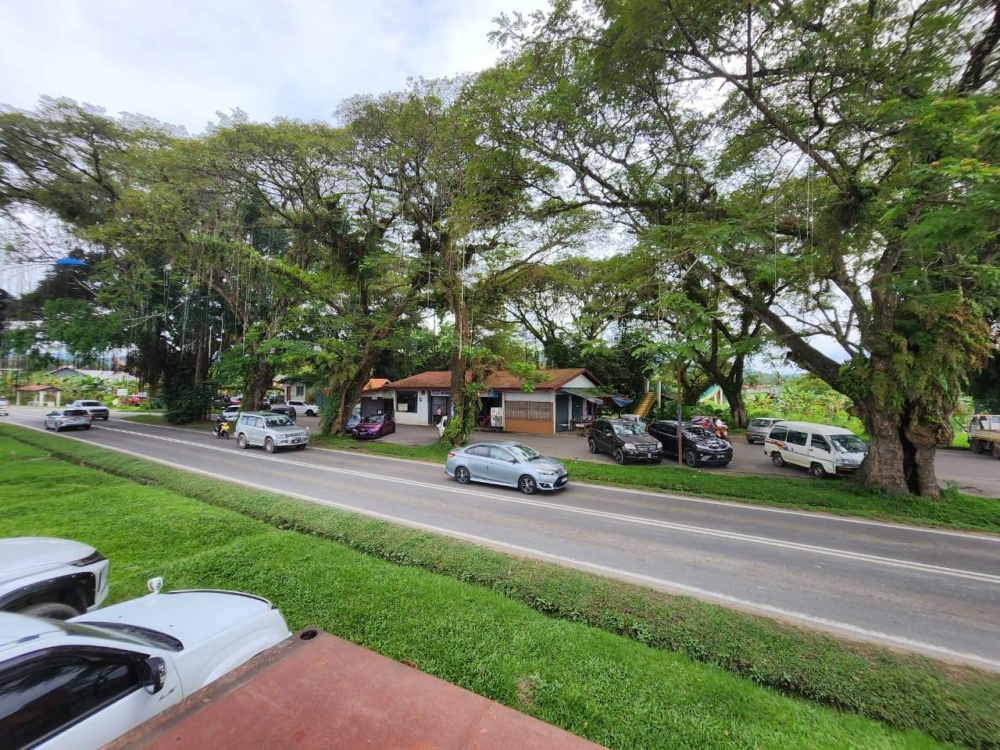KOTA KINABALU, Dec 28 — Residents of Penampang are unhappy that there have been talks that five iconic “rain trees” in the Kasigui area will be cut down soon to make way for a road widening project said to be part of the Pan Borneo Highway.
Talk about the project has people waxing lyrical about the trees, as well as a nostalgic row of shop lots that have been around for some three generations and are a part of the local community.
The five majestic trees, some two stories high, sit on the roadside of the main Penampang road, coming down from Moyog and Tambunan and it fronts a row of shop lots that serve as a popular pit stop for breakfast and lunch.
Both the trees and the shop lots are considered a landmark of the area and bring a lot of nostalgic value to those who frequent Penampang.
Former Penampang MP Datuk Philip Lasimbang highlighted the matter when he made a Facebook post with pictures of the iconic trees — captioned “save the trees” along with what is believed to be the project blueprints for the area.
He commented that town or road planners in government should take into consideration all factors when developing an area.
In Kota Kinabalu, there are roughly 100 trees that have been designated as heritage trees by City Hall. However, it is not known whether Penampang has any such initiative.

Ronnie Ting, who operates the main coffee shop among six other businesses with his mother, said that they had heard about the plans for some time now but have yet to receive any official notice from the district office of any other authority.
However, Ting said that in the last week, they have had patrons and visitors come over to the shop to talk about the future of the lots and the trees, and many have stopped by just to take photos with the trees in case the tree is felled in the near future.
His coffee shop, Kasigui No 1, is one of two eateries, and sells “economy” breakfasts and lunches and their “kon lau mein” are the most popular dish that customers frequent the shop for. The four others are micro-businesses selling produce and other groceries.
“We have been hearing about the project, which people are saying is part of the Pan Borneo highway and that we will be asked to move. There are works being carried out now right across the road, but we have yet to receive any kind of notice,” he said.
Ting, 35, has grown up in the coffee shop along with his mother and grandmother, and now brings his two young children to the shop.
“Kasigui was actually a little township many decades ago, in the 40s and 50s, with wooden shophouses and its own marketplace which was the main area to catch up on the village news at the time,” said a regular visitor who only wanted to be known as Joe.
Kasigui was the former administrative centre for Penampang during the British North Borneo times and those who came from the hillsides of Moyog would stop in Kasigui to get their supplies.
“It is a place of history, but now all we have left is one row of shops with two eateries, and our precious trees,” he said.
Donggongon, just a short drive 1.5 km away, is now the centre of Penampang, which is a bustling hive of activity on any given day.
“We have to make way for development and progress, yes, but some things are also worth preserving. It is so sad to see people discard the old and valuable for the new. Those old things may not be seen to be profitable, but they are priceless,” said Joe.






















